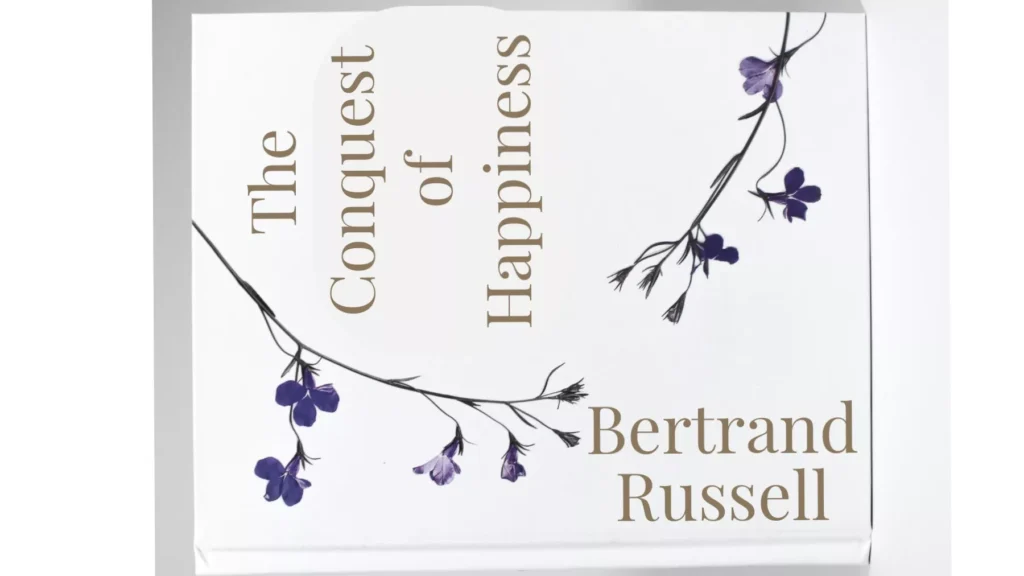“The purpose of our lives is to be happy.” – Dalai Lama
Being happy in this stressful world seems to be impossible for an ordinary person. We have plenty of reasons to be unhappy in our daily lives from work to family, from financial issues to heartbreaks, unhappiness could be the most common phenomenon one can find in our world. With all this in mind, one can fear if is there a way out. Is this even possible and in our control to be happy or sad? Can happiness be conquered as suggested by Bertrand Russell in his book “The Conquest of Happiness”?
With plenty of grounds to be sad in my life, I have always been on the lookout for ways to find a happier and more fulfilling life. I was intrigued when I came across Bertrand Russell’s book, “The Conquest of Happiness”. Russell, a British philosopher, and Nobel Prize winner is known for his contributions to logic, mathematics, and philosophy. However, “The Conquest of Happiness” is one of his most accessible works that anyone can read and understand.
“Happiness is not a destination, it’s a journey. Happiness is not tomorrow, it is now. Happiness is not a dependency; it is a decision. Happiness is what you are, not what you have.” – Zig Ziglar
The book consists of two parts and the first part discusses the causes of unhappiness. It sounds perfectly rational to me to talk about the reasons for our unhappiness before exploring the ways to happiness. Russell discusses common obstacles that prevent people from being happy, such as fear, envy, boredom, and anxiety. In the second part, he suggests different ways in which we can find happiness.
I liked the book’s conversational tone. Russell puts forward his opinion and suggestions on the topic as if he is speaking directly to the readers, sharing his own experiences and struggles in a relatable way. It makes the book feel like a friendly conversation with a wise, knowledgeable friend. Another aspect I appreciate of the book is it offers a unique perspective on the pursuit of happiness and provides practical advice on how to achieve it. I thought I should share my findings from this book with others. So, let’s talk about what I learned from this book. Of course, I will explain things in my way rather than going through every topic with the book’s sequence.
“We don’t laugh because we are happy – we are happy because we laugh”William James
Obstacles To The Conquest of Happiness
Self-pettiness & Sense of Sin
There are certainly numerous logical reasons for several people to be unhappy. They may be severely sick, have lost someone very close are broke financially, and we cannot suggest fixes for that, but a more significant number of the folks are unhappy because of their self-created fallacies. Sense of sin, as per The Conquest of Happiness, is one major reason for people to be unhappy. That may be true in Russel’s days but it is not the major reason for the unhappiness in our era. The sense of sin is a byproduct of religious belief, and so is self-pettiness, in my opinion, which Russell described as Byronic unhappiness.
Religion tells us that there is a perfect after-death life. This notion cultivated the very concept of a perfect world in our minds, otherwise, we could have been contented with this imperfect world and thought that it was the only and perfect world.
Religion has few positive contributions to this world, but what does religion say to us? This world is full of sin: we need to seek God’s mercy to be forgiven. Since no one can be sure about God’s mercy before death as God doesn’t talk to the living; unless you are a psychic. So, we need to be in constant sorrow for being in an imperfect world, despite having all the luxuries(Byronic unhappiness), and worried about God’s forgiveness which can not be guaranteed(Sense of Sin) while we are in this world. In fact, in some religions, God can be very temperamental about trivial issues like wearing pants long enough to cover your ankles can make him annoyed. So it is unnecessary to commit a big crime to be punishable in God’s court. In short, we are doomed until we are dead, and eternal unhappiness is our fate.
However, it is strange that in multiple research it was found that religious people are more contented than nonreligious people. Moreover, the researchers found that religion can play a positive role in protecting people from committing suicide. (I am not talking about suicide attacks). But can we say that religious people are happy?
Comparison, Competition & External Validation
Another obstacle in our way toward the conquest of happiness is measuring our achievements with the yardstick of “others”. What I am doing in comparison to others? How successful are others as compared to us? What do they think about us? These useless questions haunt most of us our whole life and unfortunately, we cannot fix “others” no matter how much we struggle. And others are not limited to a few people to whom we can compete but we can always find “others” doing better than us among more than 7 billion people. So it becomes a constant reason for unhappiness regardless of our success in life. We cannot appreciate the beauty and abundance around us. We cannot relish our food and are busy looking at other’s plates. We never enjoy what we have because our thoughts have been hijacked by “others” and now they control us.
“Happiness is not a possession to be prized, it is a quality of thought, a state of mind.” – Daphne du Maurier
The phenomenon of social media made things worse for people who lack critical thinking and logical reasoning. Russell couldn’t talk about it in The Conquest of Happiness because it was not a problem at his age. The competition for likes and comments, competition for looking better in pictures, competition for being famous, and comparing ourselves with others in this race are the predicaments of social media mania.
Envy
We can count envy as an extension of the above reasons for unhappiness. Comparison and competition, to some extent, can be positive but in extreme cases, they turn into envy. Envy becomes a venom in our blood ceaselessly hurting us. And in fact, the bite of any insect or reptile never kills us but the venom does which enters into our bloodstream and kills us from the inside.
Expectations and Repudiation
Of course, every one of us wants a satisfactory present and a bright future and nothing is wrong with that, but it is also important to maintain realistic expectations. The “motivational speakers” constantly encourage us to set our goals high. Aim for the best. To a degree, it is a healthy approach to strive for progress but it is detrimental to throw all of your energy and expectations into a single unrealistic goal.
“Happiness is not something you postpone for the future; it is something you design for the present.” Jim Rohn
When we have unrealistic or excessively high expectations, we set ourselves up for unhappiness when we consequently fall short of them. This can lead to feelings of frustration, disappointment, and unhappiness. Additionally, when we are constantly focused on what we do not have, we may overlook or undervalue the things that we do have, which contributes to feelings of unhappiness.
Boredom and Excitement
Excitement can be pleasurable at the moment, but it ultimately leads to boredom and dissatisfaction. Although Boredom is considered a negative element, it can be a positive one as it encourages innovation and creativity. It provides space for new ideas to emerge when you are not satisfied with what is around you. It provides a window for introspection and self-reflection and consequently to personal growth and development, nevertheless, no one likes being bored. When we take boredom with a negative approach, it may not only make us unhappy but can also lead to self-destruction. Lack of motivation & productivity, feelings of frustration, irritability, and restlessness can be the result of boredom for an immature mind. There may also be negative physical outcomes, such as increased stress and anxiety, and engagement in unproductive or unhealthy activities, such as excessive social media use or substance abuse.
Several people seek refuge in momentary excitements from boredom. Despite helping the situation, this makes things worse with every experience. In many cases, it can be addictive, leading to a constant need for stimulation to be happy. it can result in risk-taking behavior and dangerous activities. It can lead to a lack of focus or productivity in other areas of life. However, in some stances, excitement can bear positive results and provide opportunities for social interaction and community involvement, leading to increased social support and a sense of belonging when used considerately.
Overthinking
No one has the power to alter what happened in the past or any real control over our future, yet most unhappy people spend their time Overthinking about them. They repeatedly analyze or obsess over a situation, thought, or problem to an irrational degree, often without focusing on the solution or reaching any new or useful conclusions. These negative and irrational thoughts lead to increased stress, and anxiety, and ultimately, cause unhappiness.
“The happiness of your life depends upon the quality of your thoughts.” Marcus Aurelius
We often focus on the worst-case scenarios while Overthinking and becoming stuck in a cycle of self-doubt and negative self-talk and becoming unable to make decisions. It prevents us from enjoying the present moment and the good things in our lives, ultimately leading to increased stress, anxiety, and other negative emotions, making it difficult to find joy and fulfillment in life.
The Conquest of Happiness
“Happiness is not something ready-made. It comes from your own actions.” – Dalai Lama
In the conquest of happiness, Russell points out that most people believe that external circumstances, such as wealth, success, or fame, are necessary for happiness. However, he argues that this is a misconception and that true happiness comes from within. He explains that our thoughts and attitudes are more important than external circumstances and that we need to cultivate the right mindset to be truly happy.
Self-awareness and The Conquest of Happiness
The first step toward the conquest of happiness is self-awareness. It is like the diagnosis of the disease before going for any treatment. We need to understand our thoughts and emotions, and try to control them, as they are the drivers of our behavior. We need to be honest with ourselves, accept our limitations, flaws, weaknesses, and mistakes, and take responsibility for our actions. It does not mean that we should curse ourselves for our shortcomings but we need to understand that no one can be perfect. We don’t need to compare ourselves with anyone else because everyone is unique, born with a unique blend of capabilities and shortcomings.
“The greatest happiness you can have is knowing that you do not necessarily require happiness.” – William Saroyan
The cultivation of self-awareness needs practice. For this, you can use Mindfulness Meditation, Journaling your thoughts and reading them as an outsider, and use introspection. With practice, self-awareness can lead to greater self-confidence, better decision-making, and improved relationships with others and can consequently guide toward the conquest of happiness.
Sense of Purpose and The Conquest of Happiness
The key to a happy life is finding a sense of purpose, setting achievable goals, and maintaining a positive outlook in our lives.
For the conquest of happiness, having a sense of purpose in our life is crucial and it can contribute significantly to our overall well-being. When we have a clear and meaningful purpose in life, we are more likely to feel a sense of fulfillment, satisfaction, and motivation.
“Happiness is not a goal; it is a by-product.” – Eleanor Roosevelt
Developing a sense of purpose can be a deeply personal and individual process. Here are some steps you can take to help develop your sense of purpose:
Reflect on your values:
Spend some time thinking about what is truly important to you. Consider what values you hold most dear, such as honesty, kindness, or creativity.
Explore your passions:
Think about the activities or pursuits that bring you the most joy and fulfillment. These can be anything from art to sports to volunteering. Identifying your passions can help you find your purpose.
Set meaningful goals:
Identify some goals that align with your values and passions. These goals should be specific, measurable, and challenging, but also achievable.
Cultivate a Growth Mindset:
Stay open to new experiences and opportunities to learn and grow. This can help you discover new passions and interests, and help you build the skills and knowledge needed to pursue your purpose.
Connect with others:
Build connections with people who share your values and interests. This can help you find support and inspiration, and provide opportunities for collaboration and learning.
Seek feedback:
Ask others for feedback on your strengths and areas for improvement. This can help you develop a more accurate and objective sense of your abilities and potential.
The Golden Mean and The Conquest of Happiness
If you aim for The Conquest of Happiness rather than for the conquest of goals, Bertrand Russell suggests the concept of the Golden Mean which we can use as a compass. The golden mean refers to finding a middle ground or balance between extremes. It can be a key factor in achieving happiness, as it involves avoiding both excessive indulgence and excessive restraint. Pursuing pleasure to the point of excess can lead to a loss of enjoyment and satisfaction while denying oneself pleasure altogether can lead to feelings of frustration and deprivation.
The concept of the golden mean also applies to other aspects of life, such as work, relationships, and personal growth. Finding the right balance between different priorities and responsibilities can help us lead more fulfilling and satisfying lives. Not all goals are achievable and we need to know when to resign and when to stay firm on our path as our ultimate purpose for any activity is the conquest of happiness, not the conquest of frustration.
Relationships and The Conquest of Happiness
We, humans, are social creatures, and our happiness is greatly influenced by the people we surround ourselves with. Russell emphasizes the importance of cultivating meaningful relationships with friends and family, as well as finding a romantic partner who shares our values and interests.
Relationships are a fundamental part of the human experience. They provide us with emotional support, love, and a sense of belonging. Investing time and effort into building and nurturing positive relationships can have a profound impact on our overall happiness and sense of fulfillment in life. To build and maintain healthy relationships, it is essential to communicate openly and honestly with the people in our lives, to express our needs and boundaries clearly, and to show empathy and compassion towards others. Additionally, we should strive to cultivate a sense of gratitude and appreciation for the people in our lives, recognizing the positive impact they have on our happiness and well-being.
Work & Extracurricular and The Conquest of Happiness
Work and extracurricular activities can play a significant role in the conquest of happiness, as they provide us with a sense of purpose, accomplishment, and fulfillment. Here are some ways in which we can use work and extracurricular activities to enhance our happiness:
“The secret of happiness is not in doing what one likes, but in liking what one does.” – J.M. Barrie
Pursue work and activities that align with your values and interests. When we engage in work or activities that resonate with our core values and passions, we are more likely to experience a sense of meaning and purpose, which can contribute to our overall happiness.
Set achievable goals and track your progress. Having clear goals and tracking your progress can help you stay motivated and focused, and give you a sense of accomplishment as you reach each milestone.
Build positive relationships with colleagues and peers. Building positive relationships at work or in extracurricular activities can provide you with emotional support, a sense of community, and opportunities for growth and development.
Take breaks and practice self-care. It is important to take breaks from work and extracurricular activities and prioritize self-care to avoid burnout and maintain your well-being.
Use work and extracurricular activities as a way to challenge yourself and learn new skills. Engaging in activities that push you out of your comfort zone and help you learn new things can provide a sense of accomplishment and contribute to personal growth.
Finally, remember to maintain a healthy work-life balance. It is important to prioritize time for rest, relaxation, and leisure activities outside of work and extracurricular activities to avoid overworking and burnout and to maintain a sense of balance and perspective in life.
By aligning our work and extracurricular activities with our values and interests, building positive relationships, setting achievable goals, challenging ourselves, and prioritizing self-care and work-life balance, we can use these aspects of our lives to enhance our happiness and sense of fulfillment.
“Most Folks as About Happy as They Make up Their Minds to Be” Abraham Lincoln
The Conquest of Happiness- A Must-Read Book
Even though the Conquest of Happiness was written almost more than a century ago, the principles he espouses still ring true today. In a world that is becoming increasingly complex and fast-paced, Russell’s message of simplicity and living in the moment is more relevant than ever.
Happiness is a byproduct of a well-lived life. This means that we need to focus on living our lives in a certain way rather than just chasing after happiness. I would highly recommend this book to anyone interested in personal growth and well-being. While some of the language may feel a bit dated, the concepts and ideas presented in the book are timeless and relevant. Russell’s approach is thoughtful, nuanced, and ultimately inspiring. I found “The Conquest of Happiness” a thoughtful and inspiring book. It is a great reminder that true happiness comes from within and that we have the power to cultivate it in our own lives.

About the Author:
Shahid Essa is a blogger and M. Phil Scholar at Iqra University Karachi


